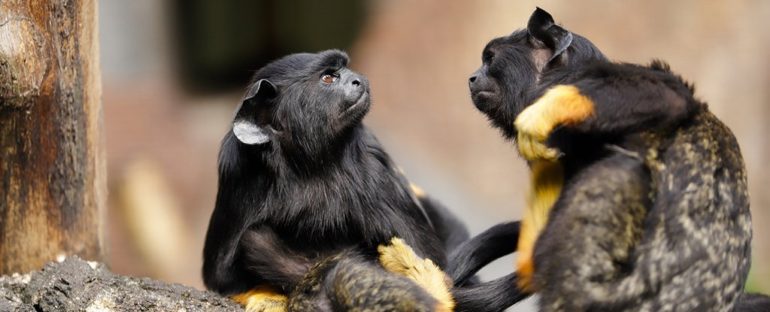A study has found that monkeys are capable of picking up new “accents” to be more friendly to their neighbors.
The study, which was published earlier this month in the peer-reviewed Behavioral Ecology and Sociobiology journal, looked at two different species of monkeys that live in the Brazilian Amazon: The bald-headed white pied tamarins and their cousins, the red-handed tamarins.
Both species of monkeys share a limited repertoire of calls, which they know from birth. These calls range from warnings against predators to mating calls, The Guardian reported.
Though they speak a similar “language,” the species make these calls in a slightly different way, similar to the way Britons and Americans speak English, The Guardian said.
The scientists found that when the monkeys share the same environment, the red-handed tamarins, which have greater vocal flexibility, changed the frequency and duration of their calls to make them sound like the pied tamarins’ calls – akin to taking on the same “accent” as their cousin.
This probably helps the species understand each other and regulate territorial disputes while they share the same environment, Dr. Jacob Dunn, a lead author of the study and an associate professor in evolutionary biology at Anglia Ruskin University, told Insider.
The study, which was published earlier this month in the peer-reviewed Behavioral Ecology and Sociobiology journal, looked at two different species of monkeys that live in the Brazilian Amazon: The bald-headed white pied tamarins and their cousins, the red-handed tamarins.
Both species of monkeys share a limited repertoire of calls, which they know from birth. These calls range from warnings against predators to mating calls, The Guardian reported.
Though they speak a similar “language,” the species make these calls in a slightly different way, similar to the way Britons and Americans speak English, The Guardian said.
The scientists found that when the monkeys share the same environment, the red-handed tamarins, which have greater vocal flexibility, changed the frequency and duration of their calls to make them sound like the pied tamarins’ calls – akin to taking on the same “accent” as their cousin.
This probably helps the species understand each other and regulate territorial disputes while they share the same environment, Dr. Jacob Dunn, a lead author of the study and an associate professor in evolutionary biology at Anglia Ruskin University, told Insider.
This article was originally published by Business Insider.
More from Business Insider:
